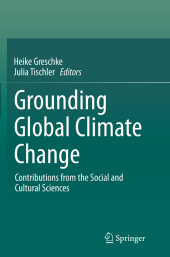 Neuerscheinungen 2016Stand: 2020-02-01 |
Schnellsuche
ISBN/Stichwort/Autor
|
Herderstraße 10
10625 Berlin
Tel.: 030 315 714 16
Fax 030 315 714 14
info@buchspektrum.de |

Heike M. Greschke, Julia Tischler
(Beteiligte)
Grounding Global Climate Change
Contributions from the Social and Cultural Sciences
Herausgegeben von Greschke, Heike M.; Tischler, Julia
Softcover reprint of the original 1st ed. 2015. 2016. x, 181 S. 1 SW-Abb., 7 Farbabb. 235 mm
Verlag/Jahr: SPRINGER NETHERLANDS; SPRINGER 2016
ISBN: 940240371X (940240371X)
Neue ISBN: 978-9402403718 (9789402403718)
Preis und Lieferzeit: Bitte klicken
This book traces the evolution of climate change research, which, long dominated by the natural sciences, now sees greater involvement with disciplines studying the socio-cultural implications of change. In their introduction, the editors chart the changing role of the social and cultural sciences, delineating three strands of research: socio-critical approaches which connect climate change to a call for cultural or systemic change; a mitigation and adaption strand which takes the physical reality of climate change as a starting point, and focuses on the concerns of climate change-affected communities and their participation in political action; and finally, culture-sensitive research which places emphasis on indigenous peoples, who contribute the least to the causes of climate change, who are affected most by its consequences, and who have the least leverage to influence a solution. Part I of the book explores interdisciplinarity, climate research and the role of the social sciences, including the concept of ecological novelty, an assessment of progress since the first Rio climate conference, and a ´global village´ case study from Portugal. Part II surveys ethnographic perspectives in the search for social facts of global climate change, including climate and mobility in the West African Sahel, and human-non human interactions and climate change in the Canadian Subarctic. Part III shows how collaborative and comparative ethnographies can spin "global webs of local knowledge," describing case studies of changing seasonality in Labrador and of rising water levels in the Chesapeake Bay. These perspectives are subjected to often-amusing, always incisive analysis in a concluding chapter entitled "You Ain´t Seen Nothing Yet: a death-defying look at the future of the climate debate." The contributors engage critically with the research subject of ´climate change´ itself, reflecting on their own practices of knowledge production and epistemological presuppositions. Finely detailed and sympathetic to a broad range of viewpoints, the book sets out a profile for the social sciences and humanities in the climate change field by systematically exploring methodological and theoretical challenges and approaches.
Introduction: grounding global climate change.- Part I: Interdisciplinarity, climate research and the role of the social sciences.- Ecological novelty: towards an interdisciplinary understanding of ecological change in the Anthropocene.- Predicting the past? Integrating climate and culture during historical famines.- Anthropology in the Anthropocene: sustainable development, climate change and interdisciplinary research.- Part II: Searching for the social facts of global climate change: ethnographic perspectives.- Climate and mobility in the West African Sahel: conceptualising the local dimensions of the environment and migration nexus.- Animal belongings: human-non human interactions and climate change in the Canadian Subarctic.- Part III: Spinning global webs of local knowledges: collaborative and comparative ethnographies.- The social facts of climate change: an ethnographic approach.- Comparing climate worlds: theorising across ethnographic fields.- Towards imagining the big picture and the finer details: exploring global applications of a local and scientific knowledge exchange methodology.- Part IV: Concluding statement.- You ain´t seen nothing yet: a death-defying look at the future of the climate debate.


